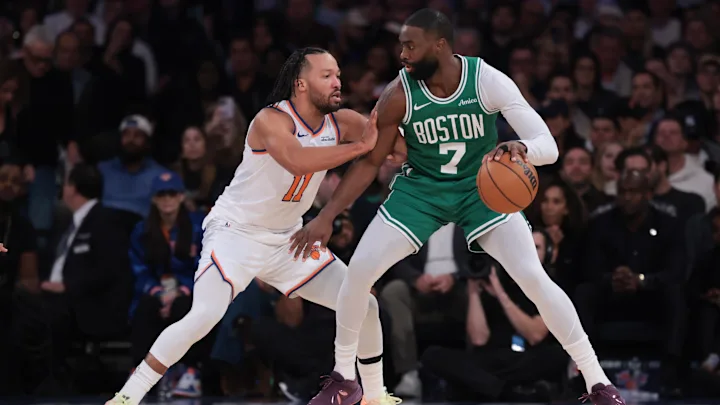Celtics Vs Knicks Review
The Celtics fall to 0-2 after a 105-95 loss to the New York Knicks. What started as a close game quickly got out of hand. After the first quarter the Celtics were never in the game, at one point being down by as much as 24 points. While they were at a massive talent discrepancy, there were some things to be concerned about going forward.
In the first quarter, we saw 10 total players get minutes. It was clear early on that Joe Mazzulla wanted a deeper rotation of players than what he had used in previous years. Initially, this strategy worked, winning the quarter 30-22.
The second quarter is when the floodgates quickly opened, losing the quarter 42-14 and going into halftime down 64-44. The offense was not sharp, committing 5 turnovers and making just 4 shots, but this team has endured rough stretches in the past. This time, they did not have the talent or the size to make up for it. A big reason why the Knicks dominated in the 2nd quarter was the size advantage, grabbing 7 offensive rebounds, which resulted in 12 second-chance points.
In the second half the defense was much better, allowing just 41 points on 36% shooting while forcing 12 turnovers, but it was already too late. The offense was clunky, predictable, and inconsistent. Being down for most of the game was too much to overcome with such a lackluster offensive performance.
The good
Outside of a disastrous 2nd quarter, the defense was excellent. Allowing 105 points in a game where 42 of them came in one quarter shows there is work to be done, but that there are some positive takeaways. Chris Boucher played an excellent defensive game, recording 4 blocks, deterring countless other shots at the basket, and making great closeouts on the perimeter.
For the game, the Celtics forced 20 turnovers while holding the Knicks to 38% shooting from the floor. Offensively, Sam Hauser kept the team in the game with timely threes, going 6/10 from deep, and Anfernee Simons showed more of his scoring ability with multiple 1-on-1 buckets.
The bad
While the defense was fine for 3 quarters, the 2nd quarter being as awful as it was cost them the game. In both games the Celtics have played, they have allowed a 42-point quarter. This is just inexcusable for such an experienced team to allow in back-to-back games. Another key reason the Celtics lost the game was rebounding. The Knicks recorded 21 offensive rebounds, which led to 21 second-chance points, while the Celtics recorded just 8 offensive rebounds and got just 7 second-chance points. In a 10-point loss, these extra possessions were detrimental.
The extra possessions the Knicks generated also caused problems on offense because of how it affected the fast break. The Celtics were never able get going on the fast break for easy buckets, instead having to rely primarily on a half-court offense. For the game, the Celtics only managed to get 2 fast break points. Nearly all of their points were hard earned, making it difficult to sustain as the game goes on.
Nearly everyone played poorly on offense, but the Celtics backcourt duo of Payton Pritchard and Derrick White was particularly awful, combining 7/28 from the floor and 4/18 from three. Jaylen Brown also had his struggles, resorting back to his tunnel vision tendencies, which led to 7 turnovers. For the game, the team recorded 16 turnovers, which led to 15 fast break points for the Knicks.
Conclusion
The three biggest problems that hurt the Celtics were turnovers, fast break points, and second chance points. In two of these areas, the Celtics were dominated, leading them to lose handily. Being such a small team is going to be a challenge, and this game showed firsthand how it can affect them. Going forward, we could see more double big lineups to prevent this. The Celtics will travel to Detroit to take on the Pistons on Sunday afternoon. With an opponent that is closer in weight class, we will see if the Celtics can find their footing after an 0-2 start.
